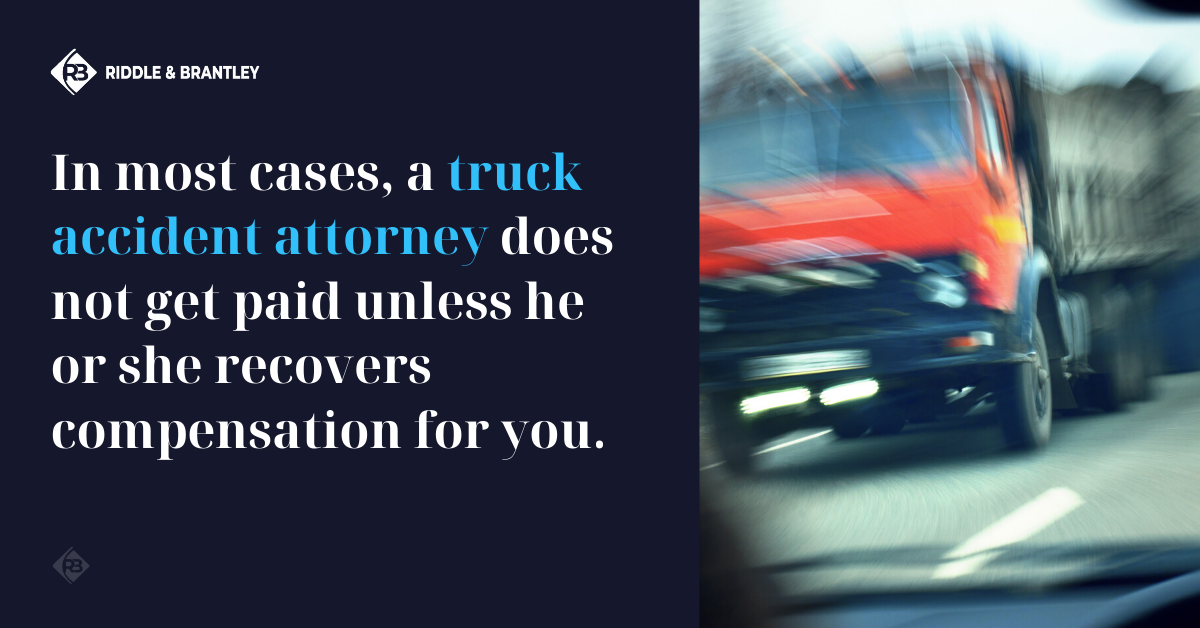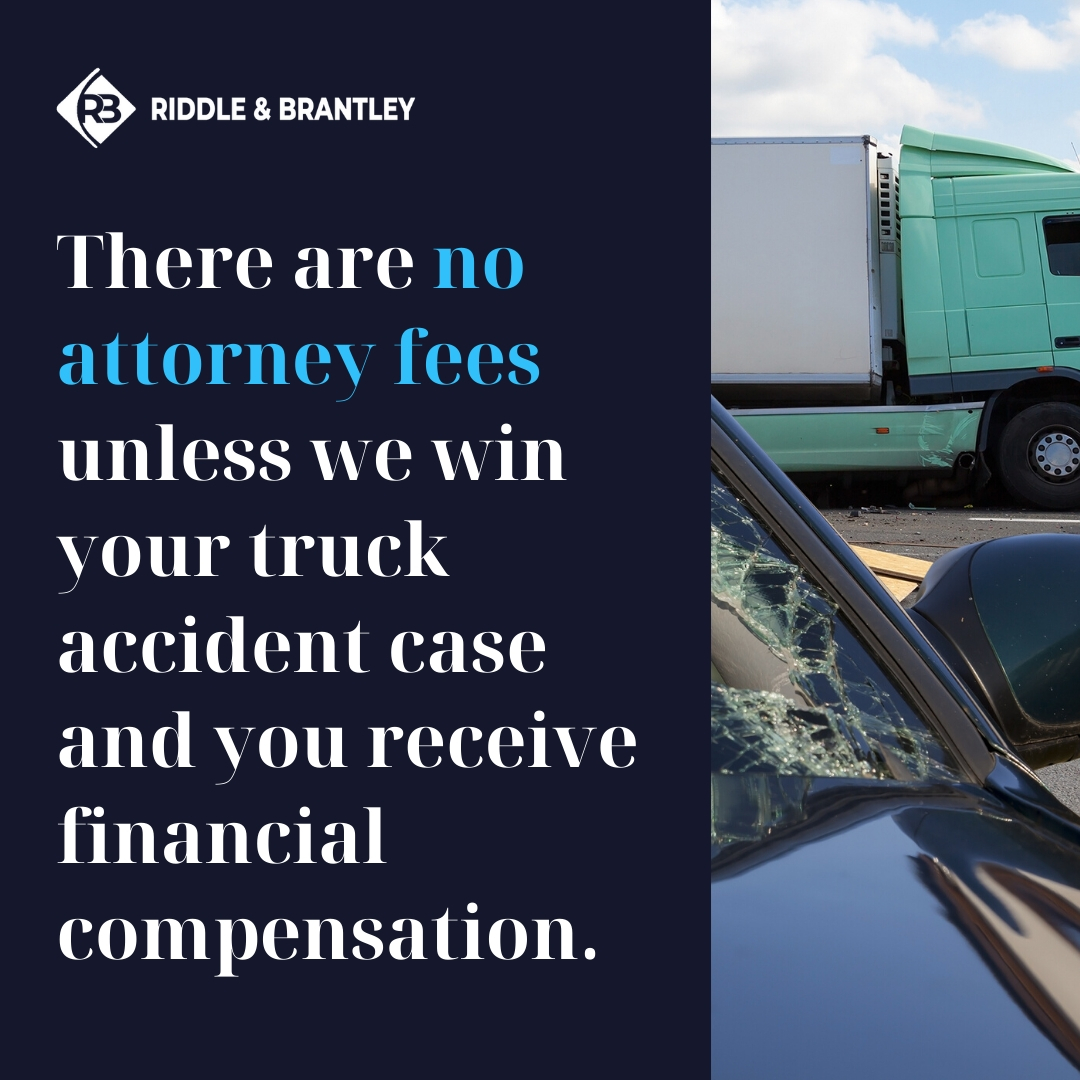Riddle & Riddle Injury Lawyers | November 28, 2024 | Trucking Accident

Truck accidents frequently happen when truck drivers, trucking companies, and others make serious mistakes while on the road. In some cases, truck drivers may engage in distracted or negligent driving, and trucking companies may fail to supervise their drivers or violate motor carrier regulations.
Truck accident lawsuits are usually necessary when the truck driver or trucking company disputes liability – or the insurance company simply refuses to offer adequate compensation.
A knowledgeable Goldsboro truck accident lawyer in your jurisdiction can file a lawsuit on your behalf and litigate your case to a resolution in the court system. They will also work to minimize your litigation expenses.
Common Injuries in a Trucking Accident
Commercial trucking accidents can result in serious injuries due to the size and weight of the vehicles involved. Victims of these accidents often suffer a wide range of physical injuries, some of which can have long-term effects on their health and well-being.
- One of the most common injuries in trucking accidents is whiplash. This occurs when the head and neck are jerked suddenly due to the crash impact, causing soft tissue damage. While whiplash can heal over time, it can also lead to chronic neck pain and headaches if not treated properly.
- Another common injury is broken bones. The force of a trucking accident can easily break bones, particularly in the arms, legs, ribs, and collarbone. In more severe cases, victims may experience compound fractures, where the bone breaks through the skin, leading to the need for surgery and a long recovery period.
- Spinal cord injuries are also frequently seen in commercial trucking accidents. Damage to the spinal cord can cause paralysis or a significant loss of mobility, depending on the severity of the injury. Victims may face lifelong challenges and require ongoing medical care.
- Traumatic brain injuries (TBI) are another major concern. A TBI can happen when the head hits an object or is shaken violently, leading to bruising or bleeding in the brain. These injuries can range from mild concussions to severe brain damage, affecting a person’s ability to think, remember, or control emotions.
- Internal injuries, such as damage to organs, can also result from the high impact of a truck crash. These injuries are not always immediately obvious, but they can be life-threatening if not treated quickly.
- Lastly, cuts and lacerations are common due to broken glass, metal, or other debris from the collision. While some cuts may be minor, deep lacerations can require stitches and leave permanent scars.
In addition to physical injuries, many victims experience psychological trauma after a trucking accident, including anxiety, depression, or post-traumatic stress disorder (PTSD). These emotional injuries may take longer to heal than the physical ones, requiring therapy and counseling.
How Do Truck Accidents Usually Happen?
Commercial trucking accidents can happen for various reasons, but many of them are the result of negligence by the truck driver or trucking company. Due to these vehicles’ large size and weight, accidents can lead to severe damage and injuries.
- One of the leading causes of trucking accidents is driver fatigue. Truck drivers often work long hours and may struggle to stay awake on the road. Federal regulations limit how many hours a truck driver can work, but sometimes, drivers or companies push these limits to meet tight deadlines. When a driver is tired, their reaction time slows, which increases the risk of a crash.
- Speeding is another common factor in trucking accidents. Truck drivers are often under pressure to deliver their cargo quickly. When they drive too fast for road conditions, the large size and weight of the truck make it harder to stop or control the vehicle, especially in inclement weather. Speeding can cause rollovers, jackknifing, or rear-end collisions.
- Distracted driving is also a major issue among truck drivers. This can include texting, eating, adjusting the radio, or even using a GPS. When a truck driver is not fully focused on the road, they are more likely to miss important signals or react too slowly to avoid a crash.
- Poor truck maintenance is another form of negligence that can lead to accidents. Trucking companies are responsible for ensuring their vehicles are in good working condition. However, some companies may neglect regular inspections and repairs to save time and money. Worn tires, faulty brakes, and broken lights are just a few examples of mechanical issues that can cause accidents.
- Inexperienced or improperly trained drivers also contribute to accidents. Inadequate training can lead to poor judgment in traffic or difficulty handling large trucks. Trucking companies must ensure their drivers are properly trained and qualified before sending them on the road.
- Lastly, overloaded trucks can be a serious problem. When a truck carries too much weight, or the cargo is improperly loaded, it can become unstable, leading to rollovers or difficulty stopping.
In all of these cases, truck driver or trucking company negligence can have devastating consequences for everyone on the road.
When is a Truck Accident Lawsuit Necessary?
A truck accident lawsuit becomes necessary when a victim suffers significant damages or injuries due to the negligence of a truck driver or trucking company, and the at-fault party or their insurance company refuses to provide fair compensation. Truck accidents can lead to severe injuries, high medical costs, and lasting effects, making it crucial for victims to recover the compensation they deserve. Here are some situations where filing a lawsuit may be necessary:

- First, if the injuries are severe or life-changing, a lawsuit may be required. Truck accidents often cause serious injuries like broken bones, spinal cord injuries, traumatic brain injuries, or even paralysis. These injuries can lead to extensive medical treatment, rehabilitation, and, in some cases, long-term care. When medical bills pile up, and the victim’s quality of life is permanently affected, pursuing a lawsuit may be the only way to receive adequate compensation.
- A lawsuit may also be necessary if the insurance company refuses to pay or offers a low settlement. Insurance companies are often more focused on protecting their profits than paying fair compensation to accident victims. They may offer a low settlement that doesn’t cover all the medical bills, lost income, and pain and suffering a victim has experienced. If negotiations fail to result in a fair settlement, taking the case to court through a lawsuit may be the only option.
- Another reason for filing a lawsuit is if the truck driver or trucking company was grossly negligent. For example, if the driver was intoxicated, extremely fatigued, or driving recklessly, they may have caused the accident through dangerous behavior. In these cases, a lawsuit may seek not only compensation for damages but also punitive damages, which are meant to punish the at-fault party and discourage similar behavior in the future.
- A lawsuit is also needed when the accident involves multiple parties. Trucking accidents often involve complex legal situations where more than one party is responsible. The truck driver, trucking company, cargo loaders, or even vehicle manufacturers may all share some of the blame. In these cases, it may be necessary to file a lawsuit to sort out the liability and ensure that the victim receives fair compensation from all responsible parties.
Litigation Options in a Truck Accident Case
When dealing with a truck accident claim or lawsuit, there are several important litigation options available to pursue compensation for injuries and damages. These options include settling the case, taking the case to court, or using alternative dispute resolution (ADR) methods. Each option has its own benefits and considerations, depending on the specifics of the case.
- Settling the case is often the most common option. In a settlement, both parties negotiate an agreement to resolve the claim without going to court. Settlements can happen at any point, even before a lawsuit is filed. One major advantage of settling is that it is usually faster and less costly than going to trial. Settlements also allow the parties to have more control over the outcome as they work together to agree on the compensation amount. However, the downside is that once a settlement is reached, the case is closed; the victim cannot pursue additional compensation later, even if their injuries turn out to be more severe than initially thought.
- If the insurance company or at-fault party refuses to offer a fair settlement, the next option is taking the case to court. In this scenario, a lawsuit is filed, and the case goes to trial. There, a judge or jury will decide the outcome. Taking the case to court can result in higher compensation – especially if the injuries are severe or if the at-fault party acted recklessly. However, trials can be lengthy and expensive, and there is always a risk that the judge or jury may rule in favor of the other party, leaving the victim without compensation.
- Another option to resolve a truck accident claim is alternative dispute resolution (ADR). ADR includes methods like mediation and arbitration, which can help settle disputes outside of court. In mediation, a neutral third party helps both sides negotiate a solution. In arbitration, an arbitrator listens to both sides and makes a decision, which can be either binding or non-binding. ADR is typically faster and less formal than a trial and can save time and money. However, the outcomes in arbitration – especially binding arbitration – can limit a victim’s ability to appeal the decision.
Common Types of Truck Accident Litigation Expenses
When pursuing truck accident litigation, whether through a trial or ADR, several expenses may arise that can add to the cost of the case. Although these expenses are necessary for building a strong case, they can quickly add up – especially if the case goes to trial. Here are the most common types of expenses incurred during truck accident litigation:

- Attorney fees are one of the largest expenses in a truck accident lawsuit. Most personal injury lawyers work on a contingency fee basis, meaning they only get paid if they win the case or secure a settlement. However, if the case goes to trial, these fees may increase due to the time and resources required for court preparation.
- Another significant expense is court fees. These include filing fees for submitting the lawsuit, as well as other administrative costs associated with the court process. If the case goes to trial, there may also be fees for requesting documents, obtaining court transcripts, or filing motions.
- Expert witness fees can also be a major expense. In truck accident cases, expert witnesses may be necessary to testify about things such as accident reconstruction, vehicle safety, or medical conditions related to the injuries. These experts provide crucial testimony that can help strengthen a case, but their services can be expensive.
- Discovery costs can add up as well. The discovery process involves gathering evidence from the opposing party, which may include depositions, obtaining documents, and other forms of information exchange. Depositions require court reporters and sometimes video recording, both of which can be costly.
- In addition, investigation costs are often necessary. Attorneys may need to hire private investigators to gather evidence, interview witnesses, or conduct background checks. This can be important in proving fault or negligence, but it adds to the overall expense of litigation.
- Lastly, travel expenses may arise if the case involves multiple parties from different locations or if lawyers and witnesses need to travel for depositions or court appearances.
In cases of ADR, such as mediation or arbitration, some of these expenses may be reduced. However, ADR processes still come with fees for mediators or arbitrators, as well as other administrative costs.
Overall, the expenses incurred during truck accident litigation can be significant, especially if the case goes to trial. An experienced truck accident lawyer can work to minimize these expenses while maximizing your overall compensation award.
Contact a Truck Accident Lawyer from Riddle & Riddle Injury Lawyers for Help Today
If you or someone you love was recently involved in a commercial trucking accident, a skilled Goldsboro personal injury lawyer can answer your questions and guide you through the process. They can also explain potential litigation fees associated with your case, work to minimize those fees as much as possible and maximize the financial compensation you recover.
For more information, please contact Riddle & Riddle Injury Lawyers to schedule a free consultation with a personal injury lawyer in North Carolina today. We have twelve convenient locations in North Carolina, including Greenville, Raleigh, Goldsboro, Jacksonville, Kinston, Charlotte, Greensboro, Durham, Fayetteville, Wilmington, Winston-Salem & Garner.
Riddle & Riddle Injury Lawyers – Raleigh Office
4600 Marriott Dr STE 500, Raleigh, NC 27612
(919) 876-3020
Riddle & Riddle Injury Lawyers – Charlotte Office
1914 J N Pease Pl Suite 142, Charlotte, NC 28262
(704) 486-5824
Riddle & Riddle Injury Lawyers – Durham Office
100 E Parrish St STE 200, Durham, NC 27701
(919) 728-1770
Riddle & Riddle Injury Lawyers – Garner Office
500 Benson Rd Suite 111, Garner, NC 27529
(800) 525-7111
Riddle & Riddle Injury Lawyers – Greensboro Office
7B Corporate Center Ct Suite 15, Greensboro, NC 27408
(336) 516-9066
Riddle & Riddle Injury Lawyers – Greenville Office
300 E Arlington Blvd Suite 2A #110, Greenville, NC 27858
(252) 397-8620
Riddle & Riddle Injury Lawyers – Goldsboro Office
601 N Spence Ave, Goldsboro, NC 27534
(919) 778-9700
Riddle & Riddle Injury Lawyers – Jacksonville Office
3466 Henderson Dr Suite 39 & 40, Jacksonville, NC 28546
(910) 455-5599
Riddle & Riddle Injury Lawyers – Kinston Office
807 N Queen St, Kinston, NC 28501
(252) 397-8624
Riddle & Riddle Injury Lawyers – Fayetteville Office
2517 Raeford Rd, Fayetteville, NC 28305
(910) 387-9186
Riddle & Riddle Injury Lawyers – Wilmington Office
1608 Queen St Suite 12, Wilmington, NC 28401
(910) 889-4064
Riddle & Riddle Injury Lawyers – Winston-Salem Office
102 W 3rd St, Ste 1007, Winston-Salem, NC 27101
(336) 516-9042
